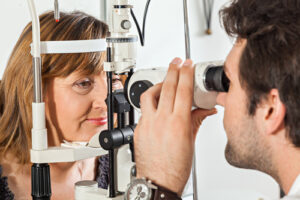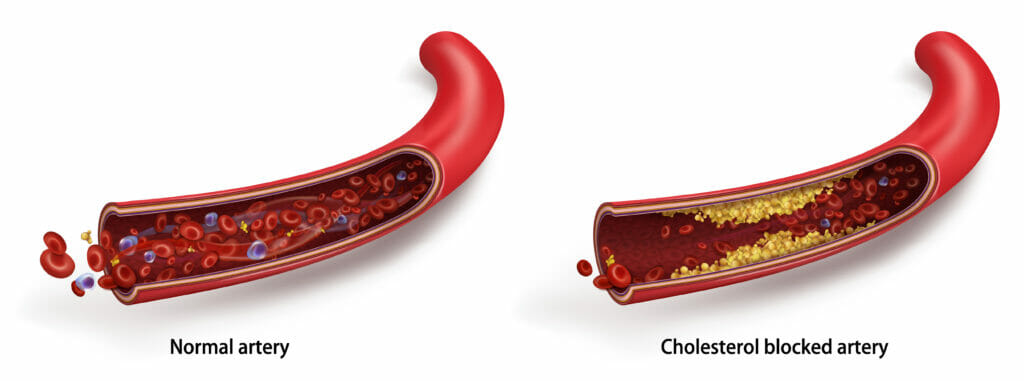Healthy vision is essential all year long. In May, the American Academy of Ophthalmology (AAO) promotes awareness about eye health and maintaining it.
Most people know that they need to see their primary care physician for a physical every year. Not as many take the time to check up on their eye health, especially if they don’t need to wear glasses or contact lenses.
But you should be seeing an eye doctor regularly, just like you’d see a general physician. Taking care of your eyes only becomes more crucial as you get older. You should also be aware of the signs of common eye-related conditions. This will help you lower your risk for these conditions while maintaining healthy habits.
Keep reading for 4 things you can do to promote eye care this Healthy Vision Month!
1. Schedule Regular Eye Exams

If you want your eyes to be healthy and stay that way, the number one thing you can do to protect your vision is to see an eye doctor regularly. Seeing your eye doctor ensures that you’ll be able to have regular eye exams.
You should have a dedicated eye doctor that you see for regular check-ups. How often you should see your eye doctor for eye exams depends on a few things.
Once you are in your sixties, you should see your eye doctor every year to check for cataracts, glaucoma, and other serious conditions. If you’re in your forties, you may need to start seeing your eye doctor for comprehensive eye exams annually.
For those that are under forty and don’t wear glasses or contact lenses, you may only need to see your eye doctor every other year. If you’re not sure, ask your ophthalmologist how often they recommend you come in.
This will vary depending on your family history, if you already have any existing eye conditions or other significant factors.
2. Know Your Risk
Knowing your risk for common eye-related conditions can help you better understand when you need to see an eye care professional. For a full assessment of your potential risks, your eye doctor needs to give you a comprehensive eye exam and go through your medical history.
But there are a few common factors that may put you at risk already for conditions like cataracts, glaucoma, diabetic retinopathy, and age-related macular degeneration. These are the most common age-related eye conditions that threaten your vision.
These factors include:
- Diabetes
- Heart disease, high blood pressure, or high cholesterol
- Using corticosteroids for an extended time
- Having a family history of eye disease
- Obesity
- Tobacco use
- Damage from extended, unprotected exposure to sunlight

If any of these factors apply to you, know that you may be at higher risk for problems with your vision. You won’t necessarily develop an eye condition if you have one of these risk factors, but as a whole, exhibiting multiple factors and being over 40 will increase your risk of developing an eye condition later on in life.
The best thing you can do is to have any issues diagnosed early through regular eye exams. Early diagnosis means you can receive early treatment, which may result in avoiding vision loss altogether.
3. Consult Your Eye Doctor About Any Persistent Issues
Regardless of your risk for various eye diseases or age, you should always see your eye doctor whenever you have persistent eye symptoms. Having dry, irritated eyes that don’t get better over time may indicate a more significant health issue or eye condition.
Sometimes, however, these symptoms are due to a common ailment called dry eye syndrome, or DES. Dry eye syndrome is more common in older adults and women especially. It can be uncomfortable, and if symptoms don’t go away on their own, there can be lasting damage to your vision.

Dry eye syndrome can be diagnosed with an advanced system that evaluates the quality of your tears. If you’re diagnosed with having dry eyes, treatment can be as simple as taking nutritional supplements and using over-the-counter artificial tears.
In some cases, other therapies or surgery may be necessary to help reduce your symptoms. But receiving a diagnosis of dry eye syndrome and having a treatment plan makes you much more likely to recover.
If your eyes feel dry, itchy, or irritated in any way and you can’t pinpoint the cause, it’s always best to see your eye doctor. Even if it’s a minor issue, it’s safest to see a professional and have your eyes examined. This way, conditions like dry eye syndrome or more serious eye diseases don’t go undiagnosed.
4. Stay Healthy
The best way to lower your risk for vision problems later in life is to maintain a healthy lifestyle while you’re an adult. This is often as simple as eating a balanced diet and staying active.
Being in shape is an excellent way to prevent all kinds of illnesses, not only eye disease. To lower your risk of developing eye diseases specifically, you should eat a diet rich in eye-healthy nutrients like omega-3 fatty acids.
Omega-3 Fatty Acids

Omega-3 fatty acids are nutrients usually found in food. You can also get them from supplements. The nutrients found in omega 3’s help you build and keep your body healthy.
They are a necessary part of the structure of every cell wall in your body. This makes them an energy source that keeps your lungs, blood vessels, immune system, and heart working properly. You’ll find many omega-3 fatty acids in oily fish like tuna, marlin, salmon, and sturgeon, among others.
You can also get omega 3-fatty acids from walnuts, seeds, and dark, leafy greens. Want to increase your intake of omega-3’s but don’t want to eat more fish? Talk to your doctor about taking omega-3 supplements.
Some habits can be bad for your eye health and general health that you should avoid. Don’t use tobacco products and don’t drink in excess. The best way to make sure your eyes stay healthy is to make sure your whole body stays healthy.
Are you wondering if it may be time for an eye exam? Find out by scheduling an appointment at Sierra Nevada Eye Center in Reno, NV, today!


